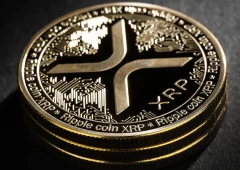Vitalik Buterin Converts Meme Coins to ETH, Donates to Tornado Cash Defense Fund
06.10.2024 11:00 1 min. read Kosta Gushterov
Vitalik Buterin, co-founder of Ethereum, made headlines today with a significant crypto transaction involving the sale of various meme coins and USDT, converting them into ETH.
These tokens had been sent unsolicited to his wallet by developers over the past year. On October 5, Buterin offloaded several assets, gaining approximately $341,000 worth of ETH.
According to Lookonchain, the sales included 11.76 billion Moodeng tokens, 70.72 million Neiro, 7.8 million Degen, and 16 billion Kabosu tokens, along with his entire USDT balance, all of which netted him a total of 140.67 ETH.
Shortly after the transaction, Buterin donated 100 ETH to the “Free Alexey & Roman” initiative, a campaign supporting the legal defense of Tornado Cash developers.
It’s unclear if the donation came from these specific sales, but this is consistent with Buterin’s ongoing practice of using meme coin proceeds for charitable causes. Earlier this year, he sold animal-themed tokens and contributed over $500,000 worth of ETH to the Animal Welfare Fund.
Buterin has publicly expressed frustration with receiving unsolicited tokens and prefers meme coin creators to donate directly to charity instead. He has also urged the crypto community to focus on designing tokens with real-world applications, such as charitable fundraising, rather than mere speculation.
-
1
Binance Could Introduce Golden Visa Option for BNB Investors Inspired by TON
07.07.2025 8:00 1 min. read -
2
Weekly Recap: Key Shifts and Milestones Across the Crypto Ecosystem
06.07.2025 17:00 4 min. read -
3
Trump Imposes 50% Tariff on Brazil: Political Tensions and Censorship at the Center
10.07.2025 7:00 2 min. read -
4
Key Crypto Events to Watch in the Next Months
20.07.2025 22:00 2 min. read -
5
USA Imposes Tariffs on Multiple Countries: How the Crypto Market Could React
08.07.2025 8:30 2 min. read
Robert Kiyosaki Warns: ETFs Aren’t The Real Thing
Renowned author and financial educator Robert Kiyosaki has issued a word of caution to everyday investors relying too heavily on exchange-traded funds (ETFs).
Bitwise CIO: The Four-Year Crypto Cycle is Breaking Down
The classic four-year crypto market cycle—long driven by Bitcoin halvings and boom-bust investor behavior—is losing relevance, according to Bitwise CIO Matt Hougan.
Strategy to Raise Another $2.47 Billion for Bitcoin Acquisition
Strategy the company formerly known as MicroStrategy, has announced the pricing of a new $2.47 billion capital raise through its initial public offering of Variable Rate Series A Perpetual Stretch Preferred Stock (STRC).
AI Becomes Gen Z’s Secret Weapon for Crypto Trading
A new report from MEXC reveals a striking generational shift in crypto trading behavior: Gen Z traders are rapidly embracing AI tools as core components of their strategy.
-
1
Binance Could Introduce Golden Visa Option for BNB Investors Inspired by TON
07.07.2025 8:00 1 min. read -
2
Weekly Recap: Key Shifts and Milestones Across the Crypto Ecosystem
06.07.2025 17:00 4 min. read -
3
Trump Imposes 50% Tariff on Brazil: Political Tensions and Censorship at the Center
10.07.2025 7:00 2 min. read -
4
Key Crypto Events to Watch in the Next Months
20.07.2025 22:00 2 min. read -
5
USA Imposes Tariffs on Multiple Countries: How the Crypto Market Could React
08.07.2025 8:30 2 min. read


